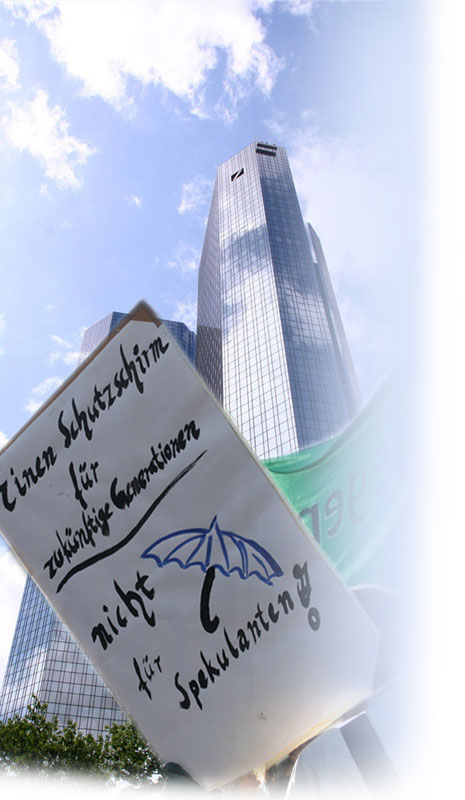Good bank instead of bad bank
 In this sense, it is absurd to save all banks with EUR19 billion. According to the Nobel Prize winning economist Joseph E. Stiglitz and Willem Buiter as well as major economic players such as George Soros, the state should lead the "systemically relevant" banks towards an orderly insolvency. The state should only buy the "good bonds" that are connected to the real economy and savings deposits. With these bonds and the network of branch offices, the state could found "good banks". For employees and clients of the previous bank, only the name and the management would change initially. According to Stiglitz and Soros, the "good bank" could seamlessly assume the core tasks of the banking system. Old banks, on the other hand, would continue to sit on the toxic investment. The tab would then be picked up by, alongside the investors, precisely the speculators who are now being supported by the taxpayers.
In this sense, it is absurd to save all banks with EUR19 billion. According to the Nobel Prize winning economist Joseph E. Stiglitz and Willem Buiter as well as major economic players such as George Soros, the state should lead the "systemically relevant" banks towards an orderly insolvency. The state should only buy the "good bonds" that are connected to the real economy and savings deposits. With these bonds and the network of branch offices, the state could found "good banks". For employees and clients of the previous bank, only the name and the management would change initially. According to Stiglitz and Soros, the "good bank" could seamlessly assume the core tasks of the banking system. Old banks, on the other hand, would continue to sit on the toxic investment. The tab would then be picked up by, alongside the investors, precisely the speculators who are now being supported by the taxpayers.
Regulation is indispensible and possible
At the end, the film shows that these alternatives are not only seriously calculated: they have also been implemented with success. Leading up to 1933, the apparently indomitable power of financial capital had already existed for some 100 years with crisis every seven years or so. This appeared to be natural law. Yet shortly after the global economic crisis in 1939, US President Franklin D. Roosevelt began to impose fundamental regulations on the financial markets. The Glass Steagal Act forced financial institutes to decide: either they are a strongly regulated business bank, concentrating on the security of deposits and credits to the real economy; or they opted for the securities business, in which they could only resort to the assets of the shareholder. Trade with derivatives was banned. Later, no bank was allowed to take over a competing bank from another US federal state. It was no longer allowed for any financial institute to become systemically relevant. Wall Street cried and predicted catastrophe. But the Act held out for over 60 years and provided for the USA - for the world - many decades of relatively stable economic relations.








